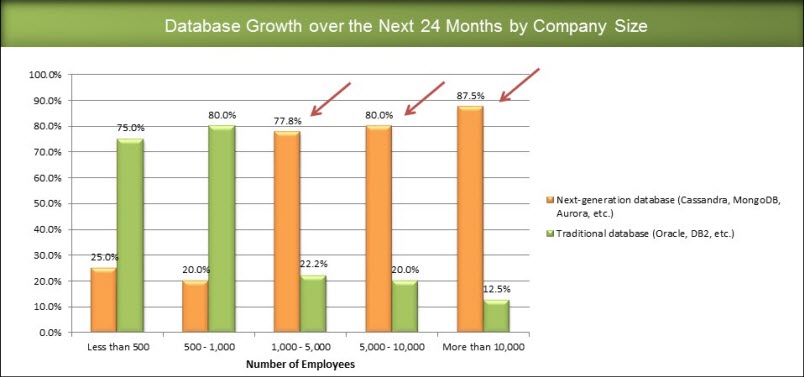 NEWS
NEWS
 NEWS
NEWS
 NEWS
NEWS
Results of a new survey by data-protection vendor Datos IO Inc. provides further evidence that scale-out distributed and NoSQL databases – or what Datos IO calls “next generation” databases – are poised for significant short-term growth.
The survey of 204 database professionals found that 83 percent expect the size of their next-generation database installation to at least double over the next two years. Growth will outpace that of traditional databases, with 58 percent of respondents saying next-generation databases will grow faster than their legacy technology. However, the survey didn’t ask about the size of current installations, so relational stores may still be larger.
Among the engines that Datos IO offered respondents as examples of next-generation databases are MongoDB Amazon Aurora, Cassandra, Amazon DynamoDB, Apache HBase, Couchbase and Aerospike.
Growth is most pronounced at the largest companies, with respondents from organizations of more than 10,000 employees anticipating an average 87.5 percent growth. However, companies of all sizes were in the 80 percent-or-greater growth range.
More than 40 percent of the 204 database professionals surveyed said their companies are already using a next-generation database and 51 percent said they are considering it. Nearly 30 percent have deployed 50 or more nodes.
“As more distributed, cloud and next-generation databases rise to the challenge in terms of scalability, performance and low cost of ownership, a select few – such as MongoDB, Cassandra, Amazon DynamoDB, and Amazon RDS – seem to be emerging as the de-facto standards for these next-generation applications,” said Tarun Thakur, co-founder and CEO of Datos IO. “But enterprises also need innovation at tooling around databases,” if they’re to sustain the current growth rate.
Scalability is clearly driving the market, with 81 percent of respondents citing grow flexibility as the top benefit of a next-generation database. Interestingly, the benefits of a flexible data model and lower cost of ownership were ranked most appealing by only 36 percent and 37 percent, respectively. These two benefits are often considered the most compelling elements of the distributed, scale-out model.
Not surprisingly, analytics topped the list of the most common applications of next-generation databases, with 54 percent of respondents citing that use scenario. That was followed by enterprise applications (37 percent), software-as-a-service (35 percent) and customer information (35 percent). The greatest non-technical barriers to adoption were seen as lack of skills (61 percent) followed by reluctance of companies to adopt new technology (44 percent). Notably, concern about open-source software was cited as an issue by only 28 percent of respondents, indicating that those long-held fears are finally abating.
Nearly 9 in 10 of respondents said backup and recovery are critical for production applications, and 61 percent said lack of enterprise class backup and recovery solutions are “a significant barrier to adopting a next-generation database.” Other frequently cited technical impediments include stability and lack of tools for monitoring and management. The majority of database pros who were surveyed said they rely upon native database replication, snapshots or manual scripting for data protection.
MongoDB was cited as the most popular next-generation database being used by a comfortable margin of 40 percent of respondents over the next most-cited solution, Amazon RDS, with 28 percent. The ranking differs somewhat from those compiled by DB-Engines, which places Cassandra, Couchbase and HBase well ahead of any Amazon offerings. The preference question was not open-ended, meaning that respondents had to choose from a list with a write-in option.
THANK YOU